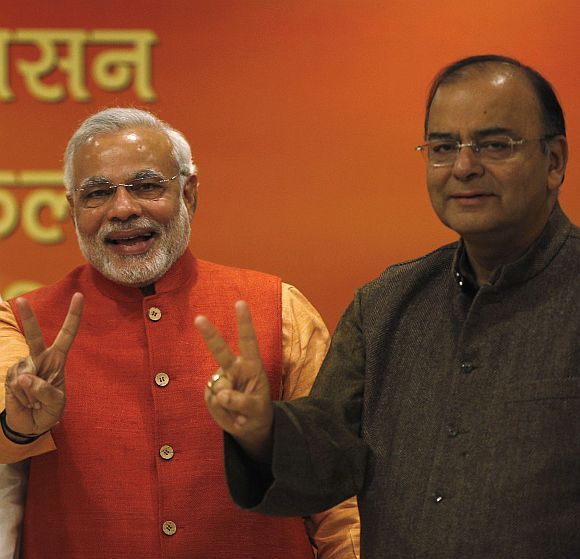A Chinese government newspaper accuses the Modi government of manipulating economic data to project the 'myth' that India has caught up with the US and surpassed China.
Rajeev Sharma explains the significance of the Global Times commentary.

Prime Minister Narendra Modi has more trouble brewing from the immediate neighbourhood, this time a country he has openly admired and emulated -- China.
For almost 21 months since Modi took over as PM, China has been very restrained and cautious about India, particularly Modi, and its media (all of which is State-controlled) has refrained from spiteful stories against India or Modi. I can vouch for this as my columns have been appearing for years in many Chinese newspapers, particularly the Global Times, which is often used to convey veiled threats to targeted countries.
The Chinese honeymoon with Modi seems to be over.
China seems to be bugged by Modi on many issues, but has chosen to vent its angst against Modi only now.
For now the Chinese anger is over economic issues. And the vehicle used for airing this anger is once again the Global Times, known for carrying rabidly anti-India opinion pieces from time to time.
The latest article published on Monday, February 15, entitled 'Modi's growth push casts shadow on chances of long-term success' accuses the Modi government of manipulating economic data to project the 'myth' that India under Modi has caught up with the United States and surpassed China.
The article has been written by Dai Yonghong, non-resident senior fellow at the Institute of Security and Development Policy, Sweden, and Wang Jianping, research assistant and postgraduate student at the same institution and can be accessed here: https://www.globaltimes.cn/content/968436.shtml
The Global Times has unabashedly launched a vitriolic attack on the Modi government's economic policies and strategies and has launched even a frontal attack on Modi personally.
Sample the following quote from the article: 'Indeed, behind Prime Minister Narendra Modi is his management experience in Gujarat, but this doesn't prepare him for successfully governing a large country, nor can his manipulated economic data be used to prove the arrival of a 'catch up with the US and surpass China' era. It can be fairly safe to say that there is still a long way to go before India can actually lead the other BRICS countries.'
Ironically, it is China more than any other country in the world that has long been criticised for using manipulated data to project economic growth way beyond the reality.
Look who is talking when the Chinese English daily accuses the Modi government of 'paper growth' of the Indian economy which has allegedly caused 'some increasingly serious social problems'!
The article notes that the Modi government has changed the statistical method of GDP and other important economic indicators several times 'to moisten the data to make the government seem more credible.'
The Chinese newspaper also questioned Modi's economic policy of pro-actively seeking an investment-oriented growth pattern, emulating what China has done for decades since the late 1970s. It finds this policy seriously flawed saying that capital can be a misfortune rather than a blessing, something which China is experiencing of late.
It concludes by warning that Modi's economic policies may become 'a success today but a failure tomorrow.'
What the Chinese daily has said is what the Congress and other Opposition parties have been saying for quite some time. But the disturbing thing from Modi's point of view is that the story of his statistical engineering has reached abroad too.
The Global Tines commentary must not be seen as a flash in the pan, but a veiled warning from China to the Modi government.
For the last six decades-and-a-half, China has used its State-owned media like its de facto foreign office. The Chinese foreign office usually indulges in window dressing, but avid China-watchers the world over know that it is through its media that one can really read the Chinese tea leaves and upcoming policy changes.
The Modi government will ignore the Global Tines commentary at its own peril.
Rajeev Sharma is an independent journalist and strategic analyst who tweets @Kishkindha










